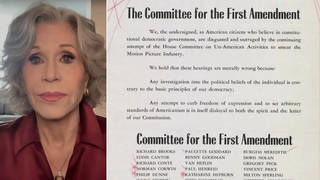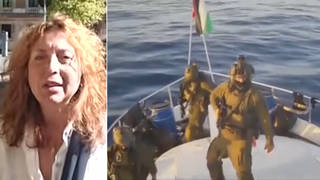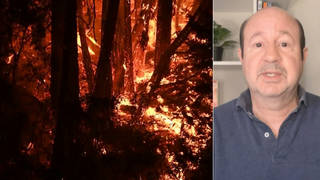
Guests
- Kapuaʻala Sproatprofessor of law at Ka Huli Ao Native Hawaiian Law Center and the Environmental Law Program, co-director of the Native Hawaiian Rights Clinic at the University of Hawaii at Manoa School of Law.
With the death toll from the Maui wildfires at 111 and as many as 1,000 still missing, we speak with Hawaiian law professor Kapuaʻala Sproat about the conditions that made the fires more destructive and what’s yet to come for residents looking to rebuild their lives. Decades of neocolonialism in Hawaii have redirected precious water resources toward golf courses, resorts and other corporate ventures, turning many areas into tinderboxes and leaving little water to fight back against the flames. Now many Hawaiians say there is a power grab underway as real estate interests and other wealthy outsiders look to buy up land and water rights on the cheap as people are still reeling from the loss of their family members, livelihoods and communities. “Plantation disaster capitalism is, unfortunately, the perfect term for what’s going on,” says Sproat, who just published a piece in The Guardian with Naomi Klein. She is professor of law at Ka Huli Ao Native Hawaiian Law Center and co-director of the Native Hawaiian Rights Clinic at the University of Hawaii at Mānoa School of Law. “The plantations, the large landed interests that have had control over not just the land, but really much of Hawaii’s and Maui Komohana’s resources for the last several centuries, are using this opportunity, are using this time of tremendous trauma for the people of Maui, to swoop in and to get past the law.”
Transcript
AMY GOODMAN: We begin today’s show in Hawaii, where the death toll from the Maui fires stands at 111, but as many as a thousand people remain unaccounted for. As the search for bodies continues, we look today at what some Native Hawaiians are calling “plantation disaster capitalism” — a growing fear that wealthy interests will seize land and water resources in this time of crisis.
The writer Naomi Klein and the Hawaiian law professor Kapuaʻala Sproat write about plantation disaster capitalism in a new article in The Guardian. They write, quote, “It’s a name that speaks to contemporary forms of neocolonialism and climate profiteering, like the real estate agents who have been cold-calling Lahaina residents who have lost everything to the fire and prodding them to sell their ancestral lands rather than wait for compensation. But it also places these moves inside the long and ongoing history of settler colonial resource theft and trickery, making clear that while disaster capitalism might have some modern disguises, it’s a very old tactic. A tactic that Native Hawaiians have a great deal of experience resisting.” Those were the words of Naomi Klein and Kapuaʻala Sproat in The Guardian.
Well, on Thursday night, I spoke to Professor Sproat from her home on the island of Kauai. She is a professor of law at Ka Huli Ao Native Hawaiian Law Center. She also co-directs the Native Hawaiian Rights Clinic at the University of Hawaii at Mānoa School of Law. I asked her to describe what’s happening on Maui.
KAPUA’ALA SPROAT: Well, mahalo, Amy, for this opportunity here.
To be quite honest, things are pretty brutal right now in Maui Komohana, or in West Maui. People are still trying desperately to find ways forward from this disaster of untold proportions. And I’m not on Maui; I’m actually on the island of Kauai, so a couple islands over. And I have not been there since the fire, but that’s also absolutely appropriate, because people who don’t need to be there should stay away but send support from afar, regardless of what that looks like, whether that means making and sending poi or writing opinion pieces or sending money. Whatever’s the best way people can support from where they are, I think, is really important. But the word from our network of folks on the ground is that people are really struggling.
I mean, our community has rallied in amazing ways, and I think that that’s part of the message that we want to get out, you know, that “Lahaina strong” and “Maui strong,” that those are more than sayings. Our people are incredibly resilient. People aren’t waiting on FEMA or even on the state or county. Relief organizations are springing up in people’s homes, in their garages, and supplies are coming in by boat, by plane, by vehicle when the roads are open.
But there are also a lot of uncertainties, and people are concerned, because what’s galling for me is I see in the midst of, you know, all of this attention and focus on resources being streamed towards Maui, that really there’s a naked power grab, and really a land and water grab, that’s also underway. There’s been talk already about folks getting offers on their homes. And I know from friends that that’s happening. But as I mentioned, there’s also water grab in the works. And the discussion around this really makes me fear for the future of Lahaina and whether or not it will be one that includes Native Hawaiians and other local people, or whether the build back will focus on outsiders.
AMY GOODMAN: Let’s talk about each issue, first the land grab. What exactly does that mean?
KAPUA’ALA SPROAT: So, to be clear, again, I am not on the ground on Maui. But what I understand from people who are there is that there are realtors and there are others who are making offers to people in their most desperate time of need, when people are, you know, desperate for funding and other resources to try to build back their lives. People are getting offers on their ancestral homes, lands that — here in Hawaii, when we talk about ancestral lands and our connection to place, we talk in generations and in hundreds of years. And so, our Native Hawaiian Rights Clinic has been on the ground in Maui Komohana working with community members for several years now, and many of our community members have long-standing relationships to place. And it’s some of these community members who are getting offers on their homes at this most difficult time, which, in my opinion, of course, is completely inappropriate.
AMY GOODMAN: You talk about plantation disaster capitalism. Explain.
KAPUA’ALA SPROAT: Plantation disaster capitalism, I think, is, unfortunately, the perfect term for what’s going on in Maui Komohana, or in West Maui, right now. The plantations, the large landed interests that have had control over not just the land, but really much of Hawaii’s and Maui Komohana’s resources for the last several centuries, are using this opportunity, are using this time of tremendous trauma for the people of Maui, to swoop in and to get past the law, basically. They’re using the emergency proclamation that the governor put into place the day after the fires, you know, ravaged Lahaina, and they’re using this as an opportunity to try to get their way, especially with respect to water resources, something they could not achieve when the law and Hawaii’s water code, in particular, were in place.
AMY GOODMAN: Talk more about the water grab.
KAPUA’ALA SPROAT: So, in Hawaii, Ola i ka wai, water is life. It’s one of our most important resources. In fact, there are many people who would say freshwater is our most important resource. And it’s what enabled our people to be able to not just survive, but really thrive in Hawaii for more than a millennia. And in Lahaina, in particular, this area, sure, it’s special for people who come on vacation and people who know Front Street, but for the people of this community, Lahaina was really the seat of the Hawaiian Kingdom. It was the capital before the island of — before Oahu. And part of the reason that that was so, that Lahaina was such an important place, was because of the abundance of resources, and the abundance of water resources, in particular.
Before the arrival of Europeans in Hawaii, Lahaina was actually known as the Venice of the Pacific, which for folks who have been there recently might seem extraordinary. Right now Lahaina has been desiccated and is almost like a dry desert area. But when it was managed by Kanaka Maoli, by Native Hawaiians, it was abundant with water and other resources. So, what happened was that with the arrival of plantation interests, those water — and especially after the capital was moved to Oahu, those resources were grabbed up by landed plantation interests, so for sugar plantations and pineapple plantations, and later those resources were diverted to support other kinds of development, including luxury residential development, and even to support hotels in some instances. And so, what happened is that the wai wai, as we call it, the wealth of Lahaina, was actually taken by these corporations.
And so, what we also know, at least the people from Hawaii, is that part of the reason for this extraordinary tragedy in Maui Komohana, or in West Maui, is also because there has been more than a century of plantation water mismanagement in this area. It’s because of extractive water policies. Where water hasn’t remained on the land, invasive grasses have come up. That’s what created the tinderbox and this unfortunate situation of the tragic fire that took place earlier this month.
AMY GOODMAN: You’ve raised the issue of the governor wasting no time in issuing emergency proclamations as the wildfires continued to burn, which suspended a series of laws, including Hawaii’s state water code.
KAPUA’ALA SPROAT: Yes.
AMY GOODMAN: Can you talk about why this is significant?
KAPUA’ALA SPROAT: I think part of what’s so disappointing in the way the governor, in partnership with large landed interests in Maui Komohana, have tried to accomplish this naked power grab — because, really, it’s more than just a water grab, it’s also a power grab — is that they’re specifically usurping both the law, and, more than that, they’re usurping long-standing and broad-based community interest and support for more proactive water management and water management that’s going to ensure that the resources benefit the people.
So, to provide some context, for several years now, Hawaii’s state water commission has proactively attempted to create what we call water management designation, which is really just a fancy term. It’s an additional layer, kind of like zoning, that goes over an area where we know water resources are threatened. And once that happens, there’s an additional layer of permitting that’s invoked, that allows the water commission to revisit allocations and how water is actually used and distributed.
This is really important, because in Hawaii we have a public trust doctrine, which means that our water resources are managed for present and future generations and cannot be owned by any individual. But the problem is that despite what we call the black letter law, in many ways in Hawaii, and for the last century at least, might has made right. And in small towns like Lahaina, companies with a lot of influence have been able to maintain control of the water resources, even when there are interests like Native Hawaiian families, like the streams themselves, that have a higher call to right or higher water rights, at least according to the black letter law.
So, part of the situation in Maui Komohana is that because of this long history of struggle, Native Hawaiians and, really, people across the community came forward, participated in public hearings before our state water commission and loudly called for more proactive water management. And in June 2022, they were successful in achieving this water management area designation for Lahaina. That means additional permit protections were put into place. And many folks, Native Hawaiians, who have superior rights but whose rights have been ignored, were able to come forward and begin a permitting process.
Unfortunately, those existing water use permit applications were due on Monday, August 7th, and the fire ravaged Lahaina on Tuesday, August 8th. And then, on Wednesday, August 9, the Governor’s Office issued these emergency proclamations, which suspended the water code. So, despite this huge effort to try and put this additional protection in place — which of course was, predictably, opposed by industry interests and development interests, but they were unsuccessful. The water commission unanimously voted for water management area designation. And yet, then, what they were unable to accomplish legally, they were able to accomplish with the support of the governor and the emergency proclamation.
And so, it’s unfortunate that what we see — and that’s why what’s happening right now epitomizes plantation disaster capitalism, because here we have a handful of incredibly privileged, large landed interests using this terrible tragedy to displace and to push through laws that they were unable to secure when Hawaii’s state water code was in place.
AMY GOODMAN: Finally, Kapua’ala, President Biden is coming to Maui on Monday. What message do you feel he needs to hear? And what do you want to see the federal government do right now?
KAPUA’ALA SPROAT: I understand that President Biden is going to be coming into Maui very shortly. And I hope what he will see and what he will learn and what he will support is the resilience of the people who are on the ground in Maui right now, the community members, like Councilmember Tamara Paltin, who are doing so much with so little. I hope he will see the resilient spirit of our community members and the tremendous need, because we need lots of support from the federal government in a whole range of areas. I hope he will also see some of the political shenanigans that are taking place, and understand that if we really want to protect the things that make Hawaii truly special, we can’t just throw out all of the laws and other things that help to protect our resources when disaster strikes.
We, as a community, need to circle up. We need to come together, and we need to lean into each other and really look to and embrace the principles that have — like aloha ’āina, that have enabled us to thrive here in Hawaii for a millennium.
AMY GOODMAN: Kapua’ala Sproat, professor of law at Ka Huli Ao Native Hawaiian Law Center. She also co-directs the Native Hawaiian Rights Clinic at the University of Hawaii at Mānoa School of Law. We’ll link to the Guardian article she co-wrote with Naomi Klein, headlined “Why was there no water to fight the fire in Maui?”
Coming up, “Teach No Lies.” As students return to school in Florida, we’ll speak with a historian leading the fight against Florida’s new Black history curriculum that claims Black people benefited from being enslaved. Back in 30 seconds.













Media Options